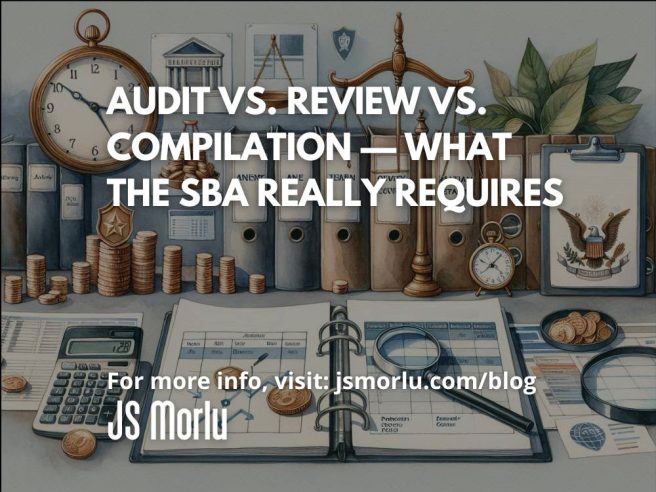By: John S. Morlu II, CPA
Introduction: Clearing the Fog
Ask five small business owners in the 8(a) program what financial reporting they need to submit, and you’ll get five different answers.
Some will say, “We just need our accountant to prepare statements.” Others will insist, “SBA requires a full audit every year.”
And many discover the truth only when they get a letter from SBA warning that their submission is non-compliant. The confusion is understandable — but costly. Understanding exactly what the SBA requires can save you missed deadlines, rejected reports, and thousands in unnecessary fees.
Why the Distinction Matters
In the world of financial reporting, not all CPA services are created equal.
SBA regulations make clear distinctions between:
- Audit
- Review
- Compilation
These levels differ in scope, cost, and credibility.
Substituting one for the other can create compliance problems or result in paying for services you don’t need.
1. Audit — The Deep Dive
An Audit is the highest level of assurance.
- Conducted under Generally Accepted Auditing Standards (GAAS)
- Involves testing internal controls, confirming balances with third parties, and extensive transaction testing
- Provides “reasonable assurance” that the statements are free of material misstatement
- Typically required when your 8(a) firm’s revenues cross the higher SBA thresholds (often $10M+ annual revenue)
Pros:
- Most credible to lenders, bonding companies, and investors
- Provides detailed insights into your internal controls
Cons:
- Most expensive
- Most time-consuming (plan for several weeks or months)
2. Review — The Sweet Spot for Many 8(a) Firms
A Review is often sufficient for SBA’s requirements for smaller 8(a) firms above the minimum revenue threshold but below the audit threshold.
- Conducted under Statements on Standards for Accounting and Review Services (SSARS)
- Provides “limited assurance” through analytical procedures and inquiries
- No direct testing of controls or confirmation with outside parties
- Less expensive and faster than a full audit, but more credible than a compilation
Pros:
- Meets SBA’s requirements for many mid-sized 8(a) firms
- More affordable and less disruptive than an audit
Cons:
- Offers less insight into internal controls than an audit
3. Compilation — Not Enough for SBA
A Compilation is simply the CPA assembling financial data into a statement format.
- Provides no assurance about the accuracy of the numbers
- Not sufficient for SBA compliance once your revenues cross the review threshold
- Acceptable only for very small businesses below SBA’s mandatory review requirements
Pros:
- Cheapest option
- Fastest turnaround
Cons:
- Won’t satisfy SBA requirements beyond the smallest firms
- Carries little weight with lenders or bonding companies
SBA’s Basic Rule of Thumb
While thresholds can change, SBA generally requires:
- Compilation: For very small 8(a) firms below the first threshold (often < $2M annual revenue)
- Review: For firms above the lower threshold (commonly $2M–$10M annual revenue)
- Audit: For firms above the higher threshold (commonly > $10M annual revenue)
👉 Always confirm the latest SBA guidelines, but don’t assume one size fits all.
The Cost of Getting It Wrong
- Submitting a compilation when SBA requires a review → Non-compliance notice
- Submitting a review when SBA requires an audit → Delays in approvals or renewals
- Paying for an audit when a review would suffice → Unnecessary expense
Mistakes like these can delay contract awards, create stress with lenders and bonding agents, and waste resources you could use for growth.
How JS Morlu Guides You
We don’t just issue reports. We:
- Assess your revenue and compliance level early to recommend the right service — audit, review, or compilation
- Prepare you for the engagement with a roadmap to get your books ready
- Communicate proactively with SBA compliance officers and your bonding company
- Deliver reports that stand up to scrutiny and meet deadlines
Our goal: No surprises. No wasted dollars. No compliance headaches.
Owner’s Takeaway
Don’t let confusion over “audit vs. review vs. compilation” derail your eligibility or growth.
The right level of assurance protects your program status, strengthens your credibility, and saves you money.
Are you unsure whether your next SBA submission requires an audit or just a review?
👉 Contact JS Morlu today for a compliance checkup. We’ll clarify your requirements and guide you to the most cost-effective and compliant path.
Author: John S. Morlu II, CPA is the CEO and Chief Strategist of JS Morlu, leads a globally recognized public accounting and management consultancy firm. Under his visionary leadership, JS Morlu has become a pioneer in developing cutting-edge technologies across B2B, B2C, P2P, and B2G verticals. The firm’s groundbreaking innovations include AI-powered reconciliation software (ReckSoft.com) and advanced cloud accounting solutions (FinovatePro.com), setting new industry standards for efficiency, accuracy, and technological excellence.
JS Morlu LLC is a top-tier accounting firm based in Woodbridge, Virginia, with a team of highly experienced and qualified CPAs and business advisors. We are dedicated to providing comprehensive accounting, tax, and business advisory services to clients throughout the Washington, D.C. Metro Area and the surrounding regions. With over a decade of experience, we have cultivated a deep understanding of our clients’ needs and aspirations. We recognize that our clients seek more than just value-added accounting services; they seek a trusted partner who can guide them towards achieving their business goals and personal financial well-being.
Talk to us || What our clients says about us





